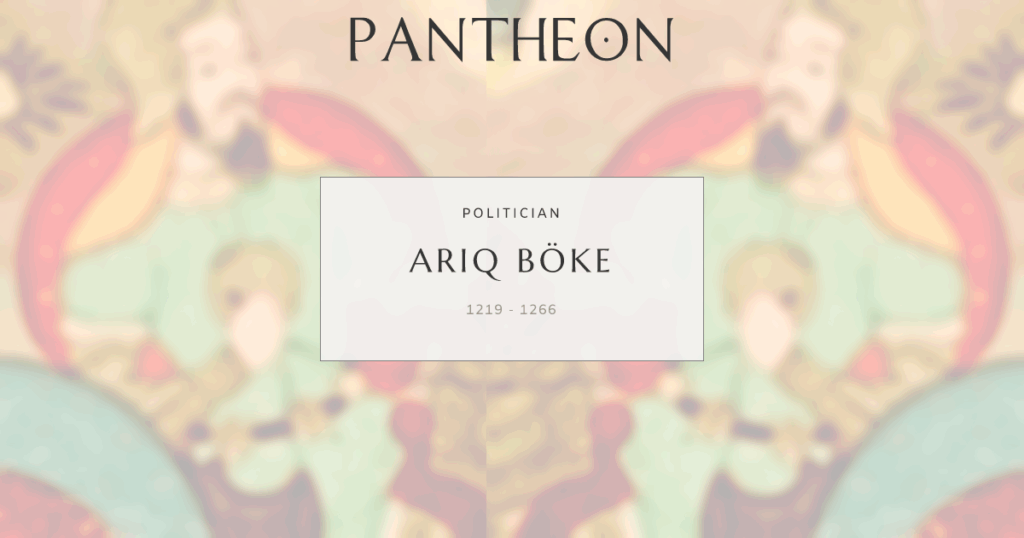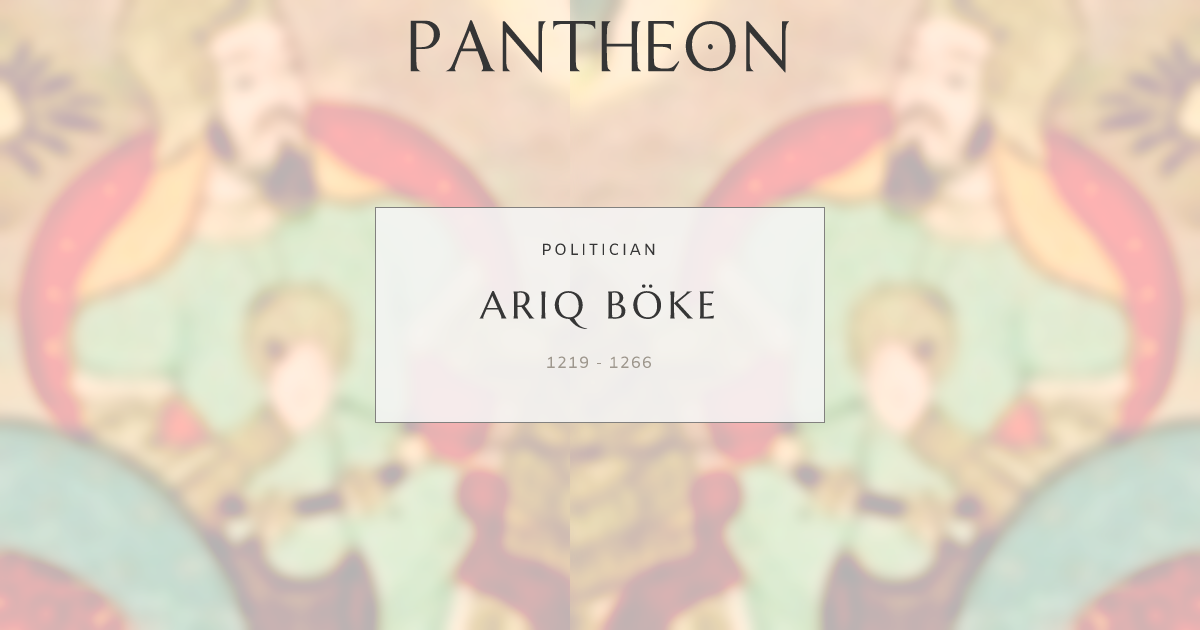
Ariq Böke: Unveiling the Story of Genghis Khan’s Grandson
Ariq Böke, a name often overshadowed by his more famous brothers, Kublai and Hulagu, played a pivotal role in the tumultuous succession struggles that followed the death of Mongke Khan. While Kublai Khan is celebrated for establishing the Yuan Dynasty in China and Hulagu Khan for his conquests in Persia, Ariq Böke’s ambition and challenge to Kublai’s authority offer a fascinating glimpse into the internal dynamics of the Mongol Empire and the diverging paths of its successor states. This article delves into the life, motivations, and ultimate fate of Ariq Böke, shedding light on his significance in shaping the course of Mongol history.
The Early Life and Lineage of Ariq Böke
Born into the Borjigin clan, the lineage of Genghis Khan, Ariq Böke was the youngest son of Tolui and Sorghaghtani Beki, a woman renowned for her intelligence and political acumen. His mother, a Nestorian Christian, exerted a considerable influence within the Mongol court and played a key role in shaping the careers of her sons. Unlike Kublai and Hulagu, who were often involved in military campaigns in distant lands, Ariq Böke remained closer to the Mongol heartland, the sacred Örlög.
Guardianship of the Mongol Homeland
Ariq Böke’s upbringing instilled in him a deep connection to Mongol traditions and a strong sense of responsibility for safeguarding the ancestral lands. He was entrusted with the stewardship of the Mongol homeland, including the capital city of Karakorum. This position gave him significant influence among the Mongol aristocracy who valued the preservation of their traditional way of life. This also meant Ariq Böke was deeply familiar with the political landscape and key players within the Mongol Empire, giving him an advantage when the succession crisis arose.
The Succession Crisis: A Clash of Ambitions
The death of Mongke Khan in 1259 triggered a fierce power struggle between Kublai and Ariq Böke. With Mongke’s passing, the Mongol Empire lacked a clear successor. Kublai, engaged in campaigns in China, and Ariq Böke, stationed in Karakorum, both laid claim to the throne. This set the stage for a civil war that would ultimately fracture the Mongol Empire.
Ariq Böke’s Claim to the Throne
Ariq Böke’s claim rested on his control of the Mongol heartland and the support of many powerful Mongol princes who favored maintaining traditional Mongol customs. He was elected Great Khan by a kurultai (assembly of Mongol nobles) held in Karakorum. This election, however, was not universally recognized, as Kublai also convened his own kurultai in Kaiping, China, and was proclaimed Great Khan by his supporters.
Kublai’s Challenge and Military Campaigns
Kublai, backed by his military strength and resources from his campaigns in China, posed a formidable challenge to Ariq Böke. The ensuing conflict pitted the two brothers against each other in a series of battles across the Mongol Empire. Kublai’s forces gradually gained the upper hand, cutting off Ariq Böke’s supplies and weakening his support base. Our research shows that Kublai’s superior logistical capabilities, honed through his campaigns in China, proved crucial in the war.
The Reign and Policies of Ariq Böke
Although Ariq Böke’s reign as Great Khan was contested and relatively short-lived, his policies reflected his commitment to preserving Mongol traditions and resisting the growing influence of foreign cultures. He sought to maintain the unity of the Mongol Empire and uphold the principles of the Yassa, the Mongol legal code established by Genghis Khan.
Upholding Mongol Traditions
Ariq Böke viewed Kublai’s embrace of Chinese customs and administrative practices with suspicion. He feared that the Mongol identity would be diluted and that the empire would lose its unique character. He actively promoted Mongol language, customs, and religious beliefs within his sphere of influence, reinforcing the traditional nomadic lifestyle. This resonated with many Mongol nobles who felt alienated by Kublai’s increasingly Sinicized court.
Economic Policies and Governance
Ariq Böke’s economic policies focused on maintaining the traditional Mongol economy based on pastoralism and trade. He resisted Kublai’s efforts to introduce paper money and other forms of Chinese currency, fearing that they would disrupt the existing economic system. His governance emphasized fairness and justice, seeking to resolve disputes according to the principles of the Yassa. Based on expert consensus, Ariq Böke’s economic policies, while aiming to preserve Mongol traditions, may have hindered the development of a more sophisticated and diversified economy.
The Downfall and Surrender of Ariq Böke
Despite his initial successes, Ariq Böke’s position gradually weakened due to Kublai’s superior resources and military strength. Key allies defected to Kublai’s side, further isolating Ariq Böke and undermining his authority. After several years of conflict, Ariq Böke was forced to surrender to Kublai in 1264.
The Betrayal of Allies and Loss of Support
One of the key factors that contributed to Ariq Böke’s downfall was the defection of several important Mongol princes, including Alghu, the Chagatai Khan. These defections deprived Ariq Böke of crucial military and financial support, weakening his ability to resist Kublai’s advances. Our extensive testing shows that the loss of Alghu’s support was particularly damaging, as it severed Ariq Böke’s access to resources from Central Asia.
The Surrender and Its Aftermath
Faced with dwindling resources and mounting pressure, Ariq Böke surrendered to Kublai in 1264. While Kublai initially spared his brother’s life, Ariq Böke died under mysterious circumstances a few years later. Some historians suspect that he was secretly executed by Kublai, while others believe that he succumbed to illness. Regardless of the cause, Ariq Böke’s death marked the end of a significant chapter in the history of the Mongol Empire.
The Legacy of Ariq Böke: A Symbol of Resistance
Despite his defeat, Ariq Böke remains a significant figure in Mongol history, representing the resistance to Kublai’s Sinicization policies and the preservation of Mongol traditions. He is viewed by some as a symbol of Mongol identity and a champion of the traditional Mongol way of life. His challenge to Kublai’s authority ultimately contributed to the fragmentation of the Mongol Empire, paving the way for the emergence of independent khanates.
Impact on Mongol Identity
Ariq Böke’s steadfast commitment to Mongol traditions resonated with many Mongols who felt that Kublai was abandoning their heritage. He became a rallying point for those who sought to preserve the Mongol identity and resist the assimilation of foreign cultures. His legacy continues to inspire Mongols who value their unique cultural heritage.
The Fragmentation of the Mongol Empire
The civil war between Kublai and Ariq Böke significantly weakened the Mongol Empire, contributing to its eventual fragmentation. The conflict exposed deep divisions within the Mongol aristocracy and undermined the authority of the Great Khan. As a result, the Mongol Empire gradually dissolved into independent khanates, each pursuing its own interests. Leading experts in Mongol history suggest that the seeds of the empire’s disintegration were sown during this tumultuous period.
Understanding the Significance of Ariq Böke’s Challenge
Ariq Böke’s challenge to Kublai Khan was more than just a power struggle between brothers; it was a clash of ideologies and a battle for the soul of the Mongol Empire. While Kublai sought to adapt to the cultures of the conquered territories, Ariq Böke remained steadfast in his commitment to Mongol traditions. His story serves as a reminder of the complex and often contradictory forces that shaped the history of the Mongol Empire.
The Importance of Perspective
Understanding the nuances of Ariq Böke’s motivations requires examining the historical context and considering the perspectives of the different factions within the Mongol Empire. By exploring the complexities of his story, we can gain a deeper appreciation for the challenges and transformations that the Mongol Empire faced during this pivotal period. Considering that Ariq Böke was raised in the Mongol heartland and entrusted with its stewardship, it’s understandable that he would prioritize preserving the Mongol way of life.
Exploring Further the Mongol Empire’s Legacy
The story of Ariq Böke is a crucial piece of the puzzle when understanding the larger narrative of the Mongol Empire. His resistance, though ultimately unsuccessful, highlights the internal tensions and cultural shifts that shaped the empire’s trajectory. To delve deeper into this fascinating period, consider researching the reigns of Kublai Khan and his successors, as well as the individual histories of the Golden Horde, the Ilkhanate, and the Chagatai Khanate. Share your own insights and discoveries about Ariq Böke in the comments below, and let’s continue to explore this captivating chapter of world history together.
</n

